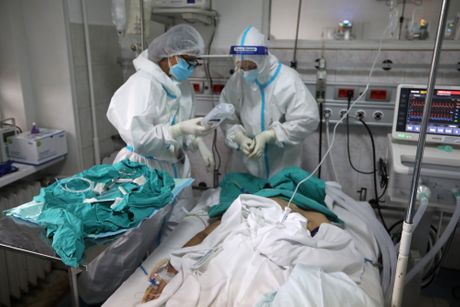Bezanijska Kosa clinic is used to "state of emergency": One in two patients on ventilators survives

Serbia's healthcare system will endure as long as it has to endure. The quality of the healthcare system in the country is precisely that it has shown itself to have an enviable degree of flexibility, fast entry and exit of certain healthcare institutions from the Covid system, the director of the Clinical Hospital Center (KBC) Bezanijska Kosa Marija Zdravkovic has told RTS.
Dr. Zdravkovic said that in November we also had an increase in the number of infected people and the inclusion of a large number of institutions into the Covid system.
"At the peak of the epidemic, around December 15, a significantly larger number of institutions were involved than at this time. We still have room for maneuver, but we are looking to always include as few institutions as possible" stressed the director of the KBC Bezanijska Kosa.
This healthcare institution worked outside the Covid system for only a month. In that month, they examined over 13,000 urgently referred patients, treated over 900 patients in the main building, about 500 patients in the outpatient hospital and about 1,000 oncology patients who were receiving therapy.
"We did our best to introduce outpatient hospitals for epidemiological reasons, which is very good according to global standards as well. A large number of people came and solved their problems, all of them were emergency patients with life-threatening problems and patients who could not be sent home to continue their treatment," stressed Dr. Marija Zdravkovic.
According to her, KBC Bezanijska Kosa has exceeded the number of 220 patients and is almost at the end of its capacity.
"We still have some of our employees working in the Covid hospital in Batajnica, as assistance there. We expect them to return so we can work at full capacity. The hardest day was Monday, when we had 132 admissions in 24 hours. I think that is the largest number of patients during the coronavirus epidemic to be admitted to one institution in 24 hours," said Dr. Zdravkovic.
She added that the clinic has an organization and a system that they have already developed, which is the basis and key to being able to take care of 132 patients, that is, 250 examinations per day.
She stressed that all coronavirus waves have a common feature in being the price paid for something that happened earlier. The moment we relax, coronavirus turns out to be not so simple an enemy.
"We have vaccinated people who get sick. There are patients who received the first dose of the vaccine a few days ago, all the wy to those who received the second dose a month ago. I have to say that the characteristic is that younger patients who are admitted exhibit more severe clinical pictures and have not been vaccinated, while older patients who have mostly received the vaccine have clinical pictures that are easier than in those previous waves," explains Marija Zdravkovic.
She added that in these big waves, most chronic patients whose condition is deteriorating have coronavirus.
"Covid shows itself as a worsening of basic chronic problems, and only then the patient develops a fever, a cough. We are already used to it, when someone's condition worsens for no reason we always do the coronavirus test and in a large number of cases it comes back positive. Coronavirus is a great burden to the body and the first sensors that react are the ones that are the weakest in the body," explains the director of KBC Bezanijska Kosa.
She points out that the average time spent in the hospital by patients whose condition does not complicate is eight days. Severe and complicated cases remain for 14 days. In this healthcare institution, in the previous period, 12.7 percent of patients have received treatment in intensive care.
"That is not exactly a small number, but the survival rate (in intesive care) was around 50 percent. We have published two papers in journals abroad and the survival rate puts us among the best hospitals in the world," said Marija Zdravkovic, and appealed on citizens not to be afraid of getting vaccinated, to register as soon as possible, or to re-apply if they are have not been invited to get innoculated.
Video: A year of fighting to save lives in the red zone of VMC Karaburma
(Telegraf.rs)
Video: Novinar Telegrafa "svat" na grčkoj svadbi: Oficiri nevestu svog kolege dočekali zveketom mačeva
Telegraf.rs zadržava sva prava nad sadržajem. Za preuzimanje sadržaja pogledajte uputstva na stranici Uslovi korišćenja.

